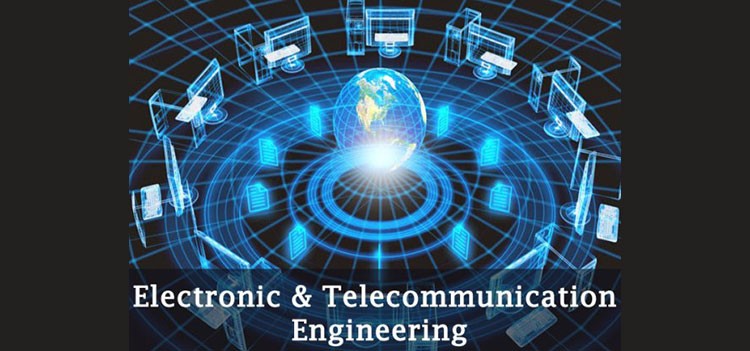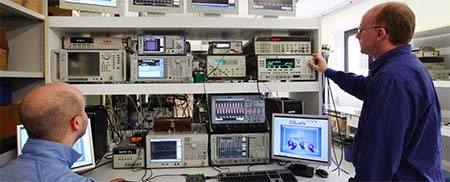Brief Introduction to Electronics & Telecommunication
Electronics is the branch of engineering which deals with the study of how to control the flow of electrons. It deals with circuits made up of components that control the flow of electricity. Electronics deals with a variety of electrical components like transistors and relays that act as switches. This lets us use electrical circuits to process information and transmit information across long distances. The control of electrons is accomplished by electronic devices that resist, carry, steer, switch, store, manipulate and exploit the electron.
Telecommunication Engineering is an engineering discipline that is centred on electrical and computer engineering which seeks to support and enhance telecommunication systems. The work ranges from basic circuit design to strategic mass developments. The telecommunication engineers are responsible to design and oversee the installation of telecommunication equipment and facilities, such as complex electrons, switching systems and other plain old telephone services. The telecommunication industry is the backbone of today’s mobile landscape, deploying voice, data, graphics and video at ever-increasing speeds and in a growing number of ways.
Introduction to B.Tech/BE Electronics & Telecommunication
B.Tech/BE Electronics & Telecommunication Engineering is an undergraduate course that is divided into 8-semesters. The course aims at teaching students about the new telecom trends in the industry and various other things like networking basics, the infrastructure of telecom, standards of mobile communication and designing of the network.
The course comprises the study of circuit design along with strategic mass developments. The course also covers a major portion of broadcast engineering and electronics engineering as they are essential for understanding signal transmission and processing. The course aims to train the students in mobile/wireless communication or networks, information technology, satellite communications, cable networks and communication devices.
Eligibility for B.Tech/BE Electronics & Telecommunication Engineering
The students who have passed PUC or 10+2 with a science background can join B.Tech/BE courses. The students interested in joining B.Tech courses are required to qualify competitive exams like CET/COMED-K/JEE with high marks in order to get merit seats in various colleges.
Admission Procedures
The students with relevant qualifications can join B.Tech/BE courses by two modes. The first one is Merit based admission and the second one is Direct admission.
Let’s discuss in detail
Merit Admission
The students who are interested to join B.Tech/BE Electronics & Telecommunications degree should mandatorily appear for CET/COMED-K/JEE or institutional-based entrance exams and undergo counselling to choose their desired colleges for merit seats. The engineering college allotts the merit seats to the students according to their rankings and marks obtained by them in their entrance exams and marks scored in PUC or 10+2.
There are two types of counselling for the B.Tech/BE students
1. Karnataka Examination Authority (KEA) Counselling
The students who are interested to join the government engineering colleges and other engineering colleges affiliated to the government should undergo the counselling procedures of Karnataka Examination Authority (KEA).
The students who intend to join for the merit seats under government quota are required to complete the counselling procedures and join for the B.Tech/BE programmes in their chosen colleges. The Engineering colleges under the Karnataka Examination Authority (KEA) are affiliated to the Visveswaraya Technological University (VTU).
2. COMED-K Counselling
The students who are interested to join the private autonomous engineering colleges and deemed universities that are affiliated to All India Council for Technical Education (AICTE) are required to apply for the COMED-K counselling procedures. The students should qualify the COMED-K counselling procedures to get admission to their desired private autonomous engineering colleges or deemed universities for Engineering programmes.
Direct Admission
The students have another option of getting admission to B.Tech/BE Electronics & Telecommunication course by direct admission process. Under this mode of admission, the students are given direct admission to their desired colleges under management quota. The direct admission students enjoy many special privileges like that they are not required to apply for any entrance exam for getting admissions. They have an option to choose their desired colleges and universities and book their seats in advance even before the starting of the academic year. The students who are interested in direct admissions are required to contact Galaxy Educational Services for more details.
Course Curriculum
The students of B.Tech/BE Electronics & Telecommunication students will be studying the following subjects during their course duration
| Sl No | Subjects of Study |
|---|---|
|
1. |
Communicative English |
|
2. |
Calculus and Matrix Algebra |
|
3. |
Computational Thinking and Problem Solving |
|
4. |
Physics |
|
5. |
Engineering Drawing |
|
6. |
Vector Calculus and Ordinary Differential Equations |
|
7. |
Computer Programming |
|
8. |
Solid State Devices |
|
9. |
Fundamentals of Electrical Technology |
|
10. |
Chemistry |
|
11. |
Linear Algebra |
|
12. |
Network Theory |
|
13. |
Electromagnetic Theory |
|
14. |
Digital Systems |
|
15. |
Signals & Systems |
|
16. |
Probability and Random Process |
|
17. |
Electronic Circuits |
|
18. |
Digital Signal Processing |
|
19. |
Transmission Lines and Waveguides |
|
20. |
Optimization Techniques |
|
21. |
Linear Integrated Circuits |
|
22. |
Control Engineering |
|
23. |
Communication Theory |
|
24. |
Microprocessor and Microcontroller |
|
25. |
Circuits and Communication |
|
26. |
Microcontrollers |
|
27. |
Digital Communication |
|
28. |
Data Communication and Networks |
|
29. |
Computer Organisation & Architecture |
|
30. |
VLSI Design |
|
31. |
Radio Frequency Engineering |
|
32. |
Information Theory and Coding |
|
33. |
Microwave Engineering |
Career & Scope
The career scope for B.Tech/BE Electronics & Telecommunications students is huge. They are basically hired in mobile companies and wireless technologies. They can find ample job opportunities in the mobile telephony sector.
Salary & Emoluments
The fresh B.Tech/BE Electronics & Telecommunication students will be earning around 4 lakhs to 6 lakhs per annum. The experienced professionals will be earning around 6 lakhs to 8 lakhs per annum.
Top Organisations hiring B.Tech/BE Electronics & Telecommunication students
Some of the top organisations hiring B.Tech/BE Electronics & Telecommunications students are:
- Vodafone
- Idea
- Airtel
- Verizon
- Jio
- AT & T
- BEL
- BHEL
Placement Opportunities
Some of the job roles available are:
Telecommunication Engineers: Telecom engineers regularly interact with co-workers, customers or other technicians. Therefore, it's essential to have good interpersonal skills and the ability to convey complex concepts to people with varying skill levels. In this role, you are responsible for managing telecom infrastructure, routers and computer networks. Telecommunications engineers also need a good understanding of VoIP and telephony networks, cabling standards, WAN protocols and ISO documentation.
Telecom Specialists: Telecoms specialists can coordinate, manage or support the design of service products and devices. Specialists may make customer appointments with installers or repairs to set up repairs or maintenance on systems, cables and other specialty equipment. Individuals in these specialist telecom jobs also provide follow-up and expertise on specific issues. Project coordinators, for instance, assist other professionals and organisations in the delivery of projects.
Equipment Installation Engineers: Also known as telecom technicians, those who work in this field usually handle telecom equipment maintenance and repairs. Their duties include planning network installations, troubleshooting outages, testing circuits and preparing installation diagrams. They must possess troubleshooting and mechanical skills as well as strong customer skills.
Telecom Project Managers: This is one of the most sought-after jobs in the telecommunication sector. Responsibilities include developing personnel policies and procedures, directing specific projects and making adjustments when needed, ensuring timely installations, implementing network security policies and more. Project managers handle a variety of projects from start to finish while ensuring compliance with the estimated timelines and costs. Those who are interested in this role need to possess a wide range of skills. They must be good communicators, manage their time efficiently and stay up-to-date with the latest industry standards and regulations. Telecom operators usually prefer candidates with a bachelor's degree in computer science or engineering.
Conclusion
The B.Tech/BE Electronics & Telecommunication Engineering students are in great demand, they are largely hired in mobile companies and tower companies. They are also hired in mobile manufacturing companies. The B.Tech/BE Electronics & Telecommunication Engineering students are well paid and can expect excellent career growth in the field. The students with a passion towards mobile and telecommunication technology can join this course.





